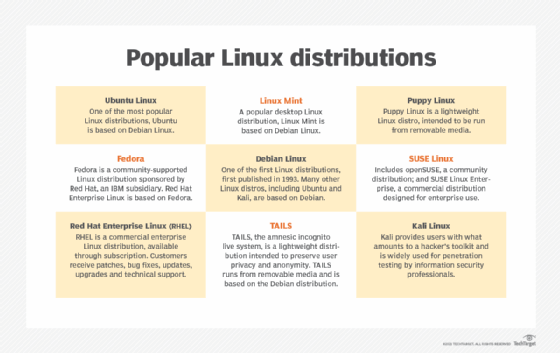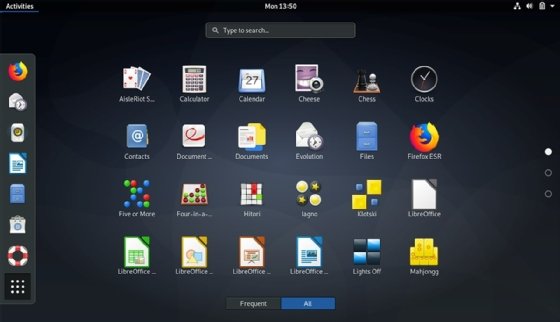Debian
What is Debian?
Debian is a popular and freely available computer operating system (OS) that uses a Unix-like kernel-- typically Linux -- alongside other program components, many of which come from GNU Project. Debian can be downloaded over the internet or, for a small charge, obtained on CD, DVD, Blu-ray disc or USB flash drive. As Open Source software, Debian is developed by nearly 1,000 active programmers from around the world who collectively form Debian Project.
Launched in 1993 by Ian Murdock, Debian Project was one of the first free software projects to achieve widespread recognition at a time when the concept of Linux distributions was still new. The name Debian -- pronounced deb-EE-uhn -- is a portmanteau that blends the creator's first name, Ian, with that of his wife, Debra.
Since its introduction, Debian Project has continued to operate as an all-volunteer organization dedicated to providing free open source software. The project has its own constitution, social contract and policy documents for organizing the project.

What is Debian GNU/Linux?
Debian GNU/Linux is the primary Debian distribution and the only distribution that has been officially released and considered ready for production. References to the Debian OS typically refer to Debian GNU/Linux, which is based on the Linux kernel. However, Debian Project has also been working with other kernels:
- Debian GNU/kFreeBSD. This distribution consists of the GNU userland and FreeBSD kernel, coupled with the regular Debian package set. However, the distribution is not an officially supported architecture. It was provided with earlier Debian releases as a technology preview, but it's no longer included in official releases.
- Debian GNU/Hurd. This distribution uses the GNU Mach microkernel, which works in conjunction with Hurd, a set of servers that run on top of the Mach microkernel. Together, they provide a foundation for the GNU OS. The Debian GNU/Hurd distribution is currently under active development but is not stable enough for a production system.

Since its inception, Debian Project has periodically released updated versions of Debian GNU/Linux. The latest version, Debian 11.2, was released on Dec. 18, 2021, only a few months after the release of Debian 11, which introduced a number of new features. Code-named bullseye, Debian 11 added support for several desktop applications and environments. It was also the first release to use a Linux kernel that supports the Extensible File Allocation Table file system. In addition, Debian 11 shipped with many new software packages, while removing packages that were considered obsolete.
Debian has been used extensively by governments, educational institutions, nonprofit organizations and commercial businesses. The OS supports multiple 32-bit and 64-bit computer architectures -- including x86, Arm, Microprocessor without Interlocked Pipeline Stages and PowerPC -- and can run on almost any PC. Debian Project maintains hundreds of mailing lists, which serve as the primary method for getting support and communicating with Debian developers.
What are packages?
A Debian distribution includes a large number of software packages that support a variety of functions. Each package includes the scripts, executables, configuration information and documentation necessary to deliver pre-compiled software that can be easily installed and operated on a Debian machine.
Debian offers over 59,000 packages that support a wide range of capabilities. For example, Debian provides packages for editing documents, developing software, administering systems, connecting to networks, debugging packages, mixing sound, routing email and playing games. All packages included with a Debian distribution are free, as outlined in the Debian Free Software Guidelines. Anyone can use and redistribute the packages and access their source code.
Each package is associated with a registered Debian maintainer who is responsible for tracking bugs, keeping the package up to date and communicating with upstream package authors. When a package is uploaded to the Debian site, the servers verify that the package comes from a registered maintainer.
Debian also includes a package management system that provides complete control over the installed packages. A computer's administrator can use the tool to install individual packages or automatically update the entire OS, while preventing specific packages from being updated. The package management system can also be used for software that has been compiled by the user.
See Linux features beyond server management, key differences in monolithic vs. microkernel architecture and how to master Red Hat, Debian approaches to Linux package management.
Explore how to check your CPU in a Linux system, how to compare the best Linux distros for enterprise servers, how the Red Hat and SUSE Linux distributions stack up and how to compare Windows and Linux for enterprise workloads.







